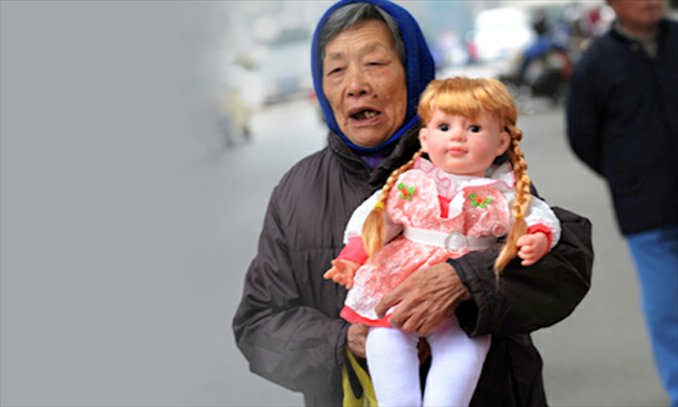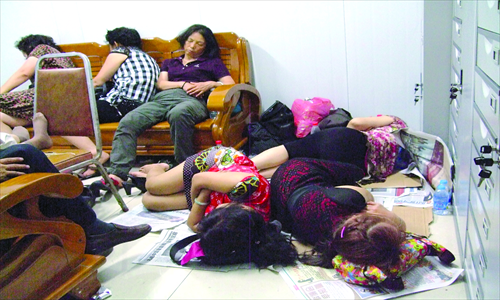Losing their only child

An elderly woman clutches a doll on the street in Jiaxing, Zhejiang Province. Photo: CFP
A group of parents having lost their only children are planning to jointly sue the National Population and Family Planning Commission (NPFPC), shortly after about 80 of them petitioned the government body in Beijing for help. They accuse the commission of failing to provide them with essential assistance and are asking for compensation.
"Although more than 30 years have passed since the family planning policy was launched, the commission has, aside from a paltry allowance, done almost nothing to guarantee the future financial security for those having lost their only child," said the draft of the indictment.
"We have contributed a lot to demographic factors that have driven the country's socioeconomic growth. But when we become lonely and helpless when our only children have died from accidents or illnesses, who will care for us?" said Jiang Li, 57, from Shenyang, Liaoning Province, whose daughter died at 25 in a 2008 traffic accident in the US.
"We don't want to blame the family planning policy. What we want is a sound security arrangement under which we can live the rest of our lives in comfort despite the fact we no longer have a child to support us," Jiang, one representative of about 1,200 people who have signed the indictment, told the Global Times.
Guangzhou Daily estimated in May that families having lost their only children total at least 1 million. This number is growing fast as around 76,000 only children between 15 and 30 years old die each year, the newspaper said.
History of family planning
China adopted the family planning policy in 1973 but its enforcement remained lax until it was formalized as a State policy in 1982. Although most couples could originally only have one child, rural couples were allowed a second if the first was a girl or suffered from certain disabilities. At the turn of the 21st century, the country loosened the policy and allowed couples who are both only children to have two children.
"Allegations that the government has done nothing are not true. The country is highly concerned about these families and provides necessary help to those whose only children are dead or disabled," Ma Li, a State Council counselor who has been engaged in China's population strategy, told the Global Times.
The Population and Family Planning Law dating back to 2002 stipulates that local governments should provide necessary assistance to parents whose only child has died by accident or illness. It stipulates that if the mother is above 49 years old, the couple can each receive a subsidy of no less than 80 yuan ($12.58) each month.
"But due to different fiscal conditions in different regions, the subsidies have varied greatly," Ma said.
Zhengzhou in Henan Province raised it to 270 yuan this year, while Jiangxi Province raised it to 170 yuan in June. In Bishan county, Chongqing Municipality, a family having lost an only child and whose mother is above 40 years old can receive 1,000 yuan a month, according to a policy launched in May 2011. About 170 families in the county benefit from the policy.
Nevertheless, for many others, conditions are becoming dire and these subsidies are not enough to keep their heads above water.
Yang Xiangwu, 66, lives in Chongqing other than Bishan county. With a pension of 1,400 yuan per month, Yang and his wife, 59, are racking up massive levels of debt since developing a cerebral infarction and lymphoma respectively after their only daughter died in 2002.
"The current policy is too limited to solve the problems. These inadequate measures will also increase public hostility towards the family planning policy," Zhao Chao, a deputy to the National People's Congress and president of Shaanxi-based Buchang Pharma Group, said in March.
According to his research in Xianyang, Shaanxi, of 246 households having lost only children, nearly half have dipped below the poverty line after spending their savings on treatments for the children, and 60 percent are not eligible for government aid since the mother is under 49.

Other options to move on
Other parents have chosen to have a second child or adopt orphans.
A couple from Changzhou, Jiangsu Province, adopted a baby daughter in 2009, three years after they lost their daughter of 22 in a car accident.
"I still feel uneasy when taking my daughter to public sites and I worry she will call me mom. Others will look at me strangely as I look more like her grandmother," the wife, 53, known as Yanzi, told the Global Times on condition of anonymity. But still, the attention and care she gives her adopted daughter have largely eased the pain of the loss of her first child.
However, most find this step hard. "For women above 45, artificial insemination is almost unfeasible. Besides, due to old age, bringing up a new baby is not that easy in terms of both energy and money," she said.
A man surnamed Wu, 64, a chemical factory retiree from Shanghai whose only child died in 2009, said he and his wife also had difficulties when getting ill and entering a rest home.
"When having operations, we have no one to sign the agreement letter. In emergencies, we have no one to take care of us. When checking into rest homes, it's hard to find a guarantee," Wu told the Global Times. "We even worry that when we die and get cremated, no one will claim our caskets."
Jiang in Shenyang said they also suffer from discrimination. In January, Jiang and dozens of others reserved several tables at a restaurant for dinner during Chinese New Year. However, the restaurant manager called back and rejected their order. The manager confessed that he was worried that, having no kids, they would bring bad luck to his establishment.
Legal appeals
Jiang is among many who are disappointed at the government's reluctance to care for them.
Since 2010, some have written to petition the NPFPC and asked for detailed regulations and relief measures. On June 5 this year, about 80 people gathered at the office of the NPFPC and asked to meet with representatives. After some stayed overnight at the office, five officials including deputy director Wang Peian from the commission met with five parents the next day. According to Jiang, the officials agreed to be in more regular communication and launch a field inspection and survey, but didn't directly address their compensation demands.
In Jiang's eyes, the officials were just trying to appease them.
"They have made such promises before. But we haven't seen any action," Jiang said. The next day, officials from the population and family planning commission escorted them home separately.
Jiang said they are now talking to lawyers and will attempt to seek justice and compensation through legal means. They also suggest a standard formula of compensation that would see the age of the dying child subtracted from the national average life-span then multiplied by half of the local annual per capita income.
According to the formula, for example, a parent may receive 523,440 yuan if their child dies at the age of 25.
Nevertheless, Yuan Yulai, a lawyer from Zhejiang Zhixing Law Firm who has taken several cases against government bodies, said the possibility of the NPFPC seeing its day in court is slim.
"The government has made some commitment instead of doing nothing. Still I think we can take other methods like calling for public attention to urge the government to make more relief efforts," Yuan told the Global Times.
Providing needed services
Yi Fuxian, a US-based author of the book Big Country in An Empty Nest, wrote in a Global Times piece in May that these challenges would become far bigger in the future.
Based on calculations from census data and current mortality rates, Yi put the number of families having lost their only child in China at 10 million by 2035.
"The traditional concept of raising children in preparation for old age becomes impossible. Furthermore, some housewives suffer not only loneliness but also economic difficulties when their husbands abandon them after their only child died," Yi said.
Yanzi confirmed that several couples she knew had broken up after their child died. "Men
can have a baby with young women even if they are quite old," she said.
Some voluntary organizations have started relief work with these families.
Wang Xiaoyuan, a volunteer with Shanghai-based Star Harbor Care Center, a non-governmental organization launched in 2003, said nearly half of the 320 families they have served found a semblance of normal life after receiving psychological help and taking part in group activities.
"In my opinion, the key thing that government officials ought to do is to correct attitudes. These people feel neglected. The country should face these problems head on and identify them," Wang said, hoping the government could increase cooperation and fund support to the NGOs.
Their volunteers have met with obstacles and misunderstanding when looking for sites to hold activities or provide assistance, she cited.
Jiang, the mother in Shenyang, said she felt ashamed of receiving the subsidies. "The workers thought they were doing charity work. In some places, they even asked families receiving their subsidies to attend public ceremonies and take pictures," she said.
Wu said he hoped the NPFPC could set up a special department to help people like him. "Most people are rational. They just hope the government can offer them a favorable policy to make their later years a little easier."
Ma Li said community service centers and NGOs are urgently needed to take care of these elderly. "These organizations, by being financed in part by the government, can provide door-to-door services to those in need," she said.